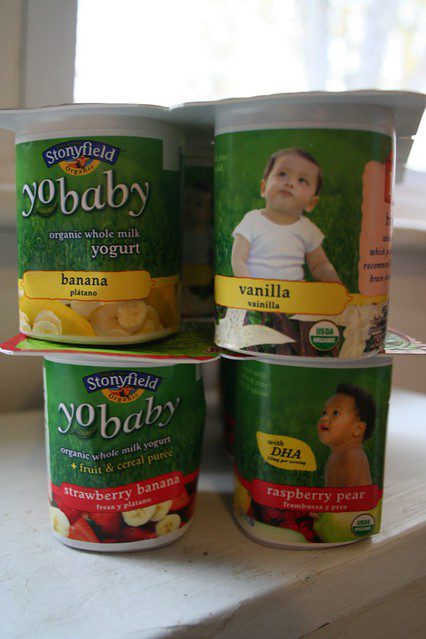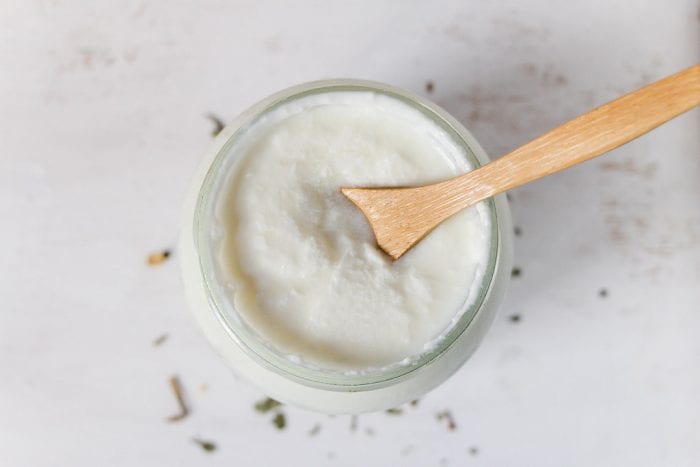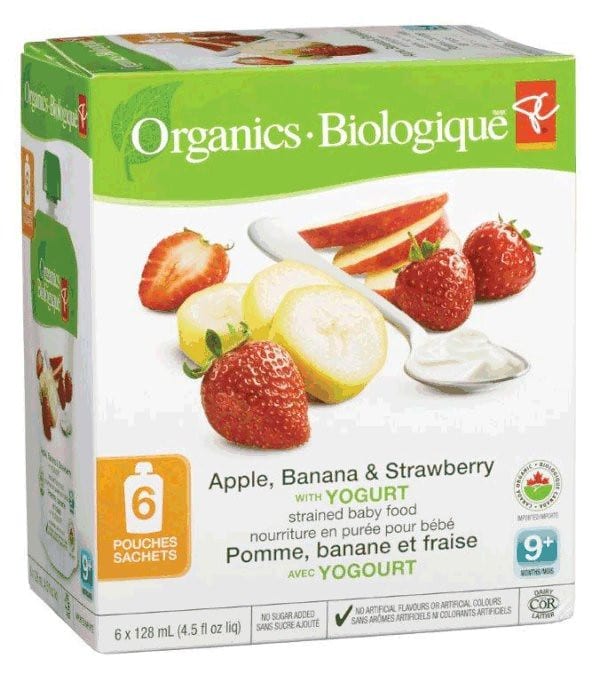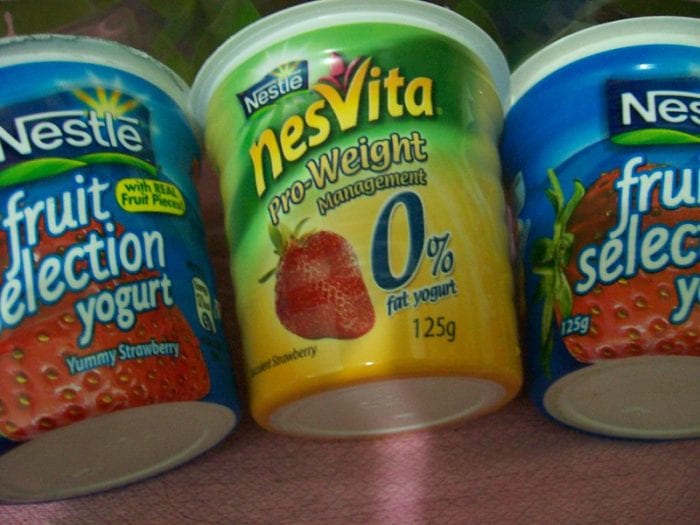Introducing solid foods to your baby is a significant milestone in their development. It marks the beginning of a journey where they explore new flavors and textures, shaping their lifelong relationship with food. While your options are quite limited, there are good choices that not only provide nutrition and benefit your baby but also help your little one appreciate food by stimulating her sense of taste – fostering healthy eating habits for years to come.

One of the better options out there is organic yogurt. The sour taste, soft texture, natural sugar from mashed berries, etc., will definitely catch her interest.
You may be wondering what is the best yogurts for your baby. Should I introduce plain yogurt or is it plain Greek yogurts? Do you buy special baby yogurt or is milk yogurt okay? We are going to discuss which type is good for your baby and which organic yogurt is better for your baby. We will also be talking about its benefits and a few commonly asked questions so that you have the answers to them.
Best Yogurt For Your Babies
Unsweetened, specifically cow’s milk yogurt, can be served to babies as an early introduction to dairy products. It is important to prioritize plain over flavored yogurts that may contain artificial sweeteners. Instead, parents can naturally flavor yogurt using pureed fruit or breast milk. In this article, we will explore the nutritional benefits of introducing plain organic yogurt to babies, discuss popular brands, such as Stonyfield Organic YoBaby, and highlight its creamy texture and certified naturally-produced qualities, which are free from growth hormones.
Types Of Baby Yogurt
Before we really get started, let’s look at yogurt, in general, to make sure you know what to look for in various yogurt options for your little one. Note that not all yogurts are made equal. While most of them are beneficial for gut health, baby adult yogurts are quite different from baby yogurts. The former usually come with artificial flavors that make them more appetizing. The latter on the other hand, must be sugar-free.

Milk
This type can be made from different kinds of milk. It could be cow’s milk, goat’s milk, dairy-free milk, soy milk, and more. You’ll also have different levels of fat in milk yogurt. It can be plain whole milk, low-fat, or even low-fat milk type.
Sugar
Some types will have a lot of added sugar. When we’re looking for food for our little one, it’s better to avoid sweetened ones, because it has high levels of added sugar.
Probiotics And Live Active Cultures
These are the micro-organisms that help to improve your body’s digestive health. Babies and toddlers need live active cultures and probiotics for healthy intestinal tracts. Essentially, live active cultures and probiotics are good bacteria that help fight off bad bacteria.
Naturally Produced
As is true with most foods, you can get yogurt made with natural whole milk or plain whole milk that isn’t organic. Some of the good yogurts for babies are made from natural ingredients without the use of synthetic pesticides, hormones, or antibiotics and are made by companies like Stonyfield Organic. Naturally-made dairy products are a great option for infants.
Plain
The baby food you choose needs to be plain, without added flavors. Plain whole milk yogurt will have all the benefits for babies and toddlers without sugar. You can add flavors to plains with other foods as your baby-led weaning progresses or your child ages.
Yogurt For Babies: There Are Many Options
Have you ever gone to the store and just stared at how many best organic yogurt for babies there are, everything from plain whole milk yogurts to Greek, to dairy-free? Even with just plain standard baby food, there are tons of options. If you have, you are not alone. There are hundreds of different types out there but which one is good for your child? There are a few things that you should look for when you are looking for a yogurt made from natural ingredients for your child.

Whole Milk Should Be The First Ingredient To Consider
It should be a full-fat. This will come from pasteurized whole milk and sometimes contain cream. This is the ideal type for young babies. Your child needs full-fat yogurt because it has the essential nutrients for their development. This is particularly true for their bones and muscle development. Not to mention, their brain development. Keep in mind that babies that are under twelve months need a serving of up to thirty-three grams of fat a day and toddlers need just a little more. This is not the area where you want to get skimpy with your toddler or child.
The Presence Of Live And Active Beneficial Cultures
You also want to make sure that there are live and active cultures in the plain yogurt. The most commonly used ones are:
-
- acidophilus – Incorporating acidophilus into baby yogurt can aid in fostering a healthy gut microbiome for infants, promoting digestive balance and overall intestinal well-being during this critical stage of development.
- bifidus – Bifidus, a probiotic often included in baby yogurt, contributes to the establishment of a healthy gut flora in infants, supporting their digestion and immune system development.
- bulgaricus- Lactobacillus bulgaricus is the primary bacterium utilized in the making of yogurt
- thermophilous – Incorporating yogurt containing thermophilic bacteria into a baby’s diet can be a nutritious way to support their digestive health and overall well-being.
- rhamnosus – Lactobacillus rhamnosus is a beneficial bacterium commonly found in yogurt and other fermented foods. When included in a baby’s diet through yogurt consumption, L. rhamnosus can offer several potential benefits.
- casei – L. casei has been associated with a reduction in symptoms of digestive discomfort, such as diarrhea and constipation, in some infants.
The live active cultures are going to help with two things. They are going to make gut probiotics. However, if your child needs a boost of probiotics, yogurt is not the recommended way to get that boost. It’s ok to introduce it as first food as early as 6 months of age, but you don’t want to feed your little one too much of it by trying to get them more probiotics.
Why You Should Have Plain, Unsweetened, Whole-Milk Food Items For Children?
When you pick up something that has added flavors, it is likely going to have added sugars. This can cause obesity in children and even cause tooth decay. That is why giving plain type to your little one is the way to avoid getting any added sugars. The best organic yogurt for your child will be plain whole milk yogurt.
In the yogurt aisle, choosing the best organic yogurt for babies often means opting for plain unsweetened or milk plain yogurt, like plain Greek over flavored yogurt, as you can flavor plain it naturally with items like mashed banana. It’s beneficial to serve food that is simple and natural, ensuring babies eat yogurt that is wholesome and rich in vitamin D.
If you want to check how much sugar is in an item look at the nutrition label. Keep in mind that this food has natural sugars that appear due to the lactose. You will check the ingredient list instead. You will look for things that indicate sugar. This includes evaporated cane juice, corn syrup, and any other ingredients like that. Maple syrup is also not healthy for babies under 12 months. Maple syrup can reduce the diversity of foods the child is interested in, and it may increase the risk of obesity and type 2 diabetes which has a negative impact on cardiovascular health.
Keep in mind that your child needs the calories that are found in full-fat yogurt and the healthy fats that are also found in it. That is why you should never use fat-free or reduced-fat yogurts unless your doctor advises you to use this particular type.

Adding Flavors To Plain Yogurt
We all know that plain yogurt is a bore, however, what do you add to it to make it taste better especially for picky eaters without getting all that extra sugar? You can add fruits, fruit puree, and veggies to it. A simple way to make it taste better is to add some baby food. If your child is a little older and their taste buds change, you can mix chunks of fruits like bananas or veggies. However, some of the good additions are avocado that has been mashed, oatmeal, and applesauce. And, if you’re doing self-feeding, you can try adding any of the foods your baby loves. These are all great options for babies.
One other way to sweeten plain whole milk yogurt for babies and toddlers is with sweet potato. Most babies will love the taste of it and there are a lot of nutrients in sweet potatoes. Do NOT use honey to sweeten plain yogurt for babies who are under a year old. Honey can cause botulism in babies.
Yogurt For Babies FAQs
What Type Of Yogurt Is Best For Babies?
Your little one is going to need a yogurt that is made from natural ingredients, whole-fat, or full-fat, and has live cultures. Other than these three things, your child can have whatever yogurt is good. One thing to watch out for is any kind of allergic reaction. If you’re feeding your little one plain whole-milk yogurt and you observe an adverse reaction, you may need to look into dairy-free yogurts for your child.
Food allergies are one of the reasons it’s important to introduce just one food at a time, even with baby-led weaning. It allows you to know what the adverse reaction was caused by. It’s also beneficial to know what your child’s common allergen is before serving yogurt to them.

How Much Of Yogurt Can An Infant Have?
You can start introducing yogurt to your child around eight months old. They can have a teaspoon here and there mixed in with their favorite foods. If you’re doing baby-led weaning, you can look for the signs that your child is ready for solid food, however, it’s still good to use 6-8 months as a guideline for giving plain yogurt.
Can An Infant Eat It Every Day?
No, babies should not be eating yogurt every day. You can feed them once in a while with a teaspoon mixed in with their favorite foods. However, you should wait until they are at least eight months old in age. Once they get into toddlerhood, then they can start having a small bowl of yogurt daily.
When introducing yogurt to a baby, it’s possible to offer it every day, choosing from many baby yogurts like nondairy type or ones with fruit flavors, and enhancing them with apple cinnamon, cooked beets, or unsweetened applesauce; adding seed butter can create a thicker texture, making it an appealing way to introduce yogurt to their diet.

Can Babies Have The Greek Yogurt?
Babies are allowed to eat Greek yogurt. You want it to be plain, pasteurized, and organic. The yogurt should be made from whole milk. Greek yogurt is great because it has more protein in it than regular plain type. It’s extra creamy, too, which is something most babies and toddlers love.
Why Can Infants Have Yogurt But Not Milk?
Yogurt contains active cultures that make it easier to digest. The lactose and protein that are found in it are going to be much easier to digest than plain whole milk alone. Yogurt is fermented and this makes the proteins easier to digest in the small tummies. Both Greek and plain whole milk yogurts have plenty of live active cultures.
Is Organic Yogurt For Babies The Same As Its Regular Counterpart?
Baby yogurt is going to differ slightly. Baby yogurt is made from full-cream milk whereas regular type is often made with lower-fat milk. Plus, organic milk is used to make baby yogurt and will contain less sugar than normal yogurt. The best yogurt for babies and toddlers is going to be the one that is made specifically for their needs.

What Are The Favorite Brands Of This Infant Food In The Market?
- Stonyfield Farm YoBaby
- Oikos
- Chobani
- Siggi’s
- Fage Total
- Astro Balkan
What Are The Best Dairy-Free Naturally-Made Yogurts For Babies?
Not all children will react well to plain whole milk yogurt because of the dairy. For kids with a dairy allergy, the best yogurt for babies will likely be one that is plant-based. One that we love is So Delicious Unsweetened Vanilla. It’s completely dairy-free because it’s based on coconut milk. There once was a time when it was tough to find baby food that didn’t have dairy, but as more children have had adverse reactions to dairy, more dairy-free options for babies have been developed. Another good option for dairy-free diets is Kite Hill Greek Yogurt. It’s based on almond milk. Forager Cashew Yogurt is one of the best organic baby yogurts that is dairy-free, as well. This one gets the vote for the best yogurt that tastes the most like whole milk yogurt.
Why Shouldn’t I Give My Child Low-Fat Or Plain Types?
Babies and toddlers have different needs than we, as adults, do. Their bodies need much more fat than ours do. This is why you should only give your babies and toddlers plain whole milk yogurt so you don’t deprive your child of the fat they need. There are even some times when kids need more fat and calories than others. If you are doing baby-led weaning to introduce new foods, you’ll see the spike in the need for more calories and fats by the way your child responds to trying new foods. Children who aren’t given enough fat and calories can have gaps in their development, both physically and mentally.
Should I Give My Child Plain Whole Milk or Greek Type?
Either of these is a good choice for babies and toddlers. Greek yogurt has the added benefit of extra protein. There is plenty of good stuff in plain whole milk yogurt, too, though. The biggest things to remember are you want to stick with plain type because you don’t want the added sugars, and it’s better if the food you choose is free from synthetic pesticides, hormones, or antibiotics.
Last Updated on September 14, 2022 by Rejie Salazar
DISCLAIMER (IMPORTANT): This information (including all text, images, audio, or other formats on FamilyHype.com) is not intended to be a substitute for informed professional advice, diagnosis, endorsement or treatment. You should not take any action or avoid taking action without consulting a qualified professional. Always seek the advice of your physician or other qualified health provider with any questions about medical conditions. Do not disregard professional medical advice or delay seeking advice or treatment because of something you have read here a FamilyHype.com.